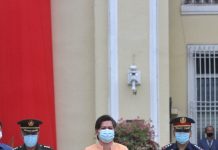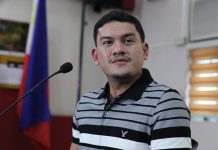The long, tedious process of getting their licenses and permits from the city’s government agencies has been the complaint of most businessmen for ages, and which has created negative publicity for the city. This lament was bared by the chief of the Davao City Investments and Promotions Center during the launching of the National Economic Research and Business Assistance Center (NERBAC) Region 11 at the Apo View Hotel, Davao City last August 18.
“If you conduct an assessment of local government units today, all fiscal incentives that are being offered are the same,” Jason Magnaye said. He added that, unlike when they founded the investment and promotion center in the city in 1994, today they can provide quick assistance to investors in setting up their businesses.
According to Magnaye, it is part of the government’s commitment to be sensitive to the needs of the people, especially those from the business sector, and to streamline, enhance and reduce the number of documents and processing time in securing their business licenses and permits.
“This is in line with the strong directive of President Aquino in his SONA to drastically reduce the processing time for business applications by NERBAC to comply with his directive,” he said.
Through Republic Act 7470 of 1992, or the National Economic Research and Business Assistance Center of the Philippines Act of 1992, the NERBAC aims to provide basic information and integrated business support services to investors in accordance with the investment priorities of the government.
Noting the birth pains of the NERBAC in the city two years ago, he added that at the end of the day, we should also be able to inform the general public that these services are available to them.”
IT-enabled uniform system
Teolulo T. Pasawa, Davao City director of the Department of Trade and Industry, said that before there was NERBAC, securing a business permit in the city would take 21 days, according to a study by an international finance corporation.
Through the NERBAC, permits may be released in less than one hour for certain types of businesses, such as trading. “But what we are issuing are temporary licenses to operate that have legal basis to set up business operations,” he said, adding that within a month the other requirements would be complied with.
So with the DTI. Pasawa said that issuing a business name also took a lot of time. “But today, we can issue it in an hour.” As long as all documents and requirements are in order, he added, “the processing will only take up to 30 minutes.”
The NERBAC developed a unified form to be filled out by businessmen in an information technology (IT)–enabled system. Once an applicant fills out the unified forms in the NERBAC, those of other agencies could also be instantly filled out.
Its partner agencies include the Bureau of Internal Revenue, Department of Labor and Employment, Cooperative Development Authority, Bureau of Investments, Bureau of Customs, Department of Environment and Natural Resources, Social Security System, Philippine Health Insurance Corporation, Home Development Mutual Fund, and Intellectual Property Office.
“Meron kasi kaming referral system with other agencies. Tatanggap ng referral form ang agency that we have referred to meron syang preferential action on the applicant,” he said.
Mobile campaign
As for the provincial NERBAC, Belenda Q. Ambi, director in Davao Oriental, said scenarios are different from the city. “Unlike the city NERBAC, isang city lang yung ise-serve nila, unlike us who will be servicing all the municipalities in the province. So, meron din kaming other system of implementing our NERBAC,” she said.
The provincial NERBACs are doing mobile campaign by caravans given that their offices are located in one municipality, which usually is the capital.
Sharing the same system, the director of Compostela Valley Province, Nelly L. Esperanza, said “We need also to campaign for other municipalities kasi meron din tayong mga businessmen who are also doing business in other municipalities, so medyo iba ang situation namin. We need to match with our existing environment,” she said.
“We visit municipalities and bring in our partner agencies so that we deliver the NERBAC services closer to the people. But again, the public knows that it is still in the start-up phase yet. This is understandable at the present stage,” she added.
Ambi also mentioned that due to lack of manpower, each partner agency has a representative in the NERBAC, but only by schedule. “In cases when the representative is not around, all the application forms are in the center so we can provide the application forms and submit them even without the representative of a certain agency,” she said.
“What is value-adding to the field operation of the NERBAC is that once the application forms have passed the NERBAC, there’s going to be a priority attention by the respective agency. Once they are endorsed by the NERBAC, they will be provided an express lane,” Esperanza said.
Hydro power plant investments
Aside from providing fast assistance in issuing business permits and licenses to investors, according to Pasawa, the NERBAC is also involved in investments promotion. “In Davao City, we have some information dissemination function and export documentation,” he said.
In Davao Oriental, the priority investment areas are agri-business, coconut, production and processing, cardava and saba bananas, abaca products, being the number one producer in the region as well as marine and aquaculture, and tourism.
“Moreover, there is already an investment plan for a hydropower plant in the Cateel river with an estimated power supply of 70-80 megawatts and Hedcor, Inc. will visit the site in September.”
In Compostela Valley, two rivers are being eyed by Hedcor and the allied group of companies for the construction of hydro power plants, which was discussed during the business matching conducted back-to-back with the launching of the NERBAC.
Esperanza mentioned that plans for the river in Camanlangan, New Bataan and Tandik river in Maragusan in Compostela province are still in the ground works. One site for hydro power will supply about 30 megawatts, enough to supply 80 percent of the provincial requirement, she said.
“Specifically, the provincial government of Compostela, potential partner Hedcor and, of course, the Davao del Norte Electric Cooperative (DANECO), are already discussing possibilities of a hydro power plant.
“These are the big ticket projects that we want to hatch, if not this year, the soonest possible time. Because we know for a fact, we cannot attract investments and industries kung magpalong-siga atong mga planta… importante gyud ni kay it’s a basic infrastructure needed in the region,” Esperanza said.
Ambi and Esperanza both said that these hydro-power plants will implement “run-off” system which will not be destructive to the river like that in the Sibulan river.






